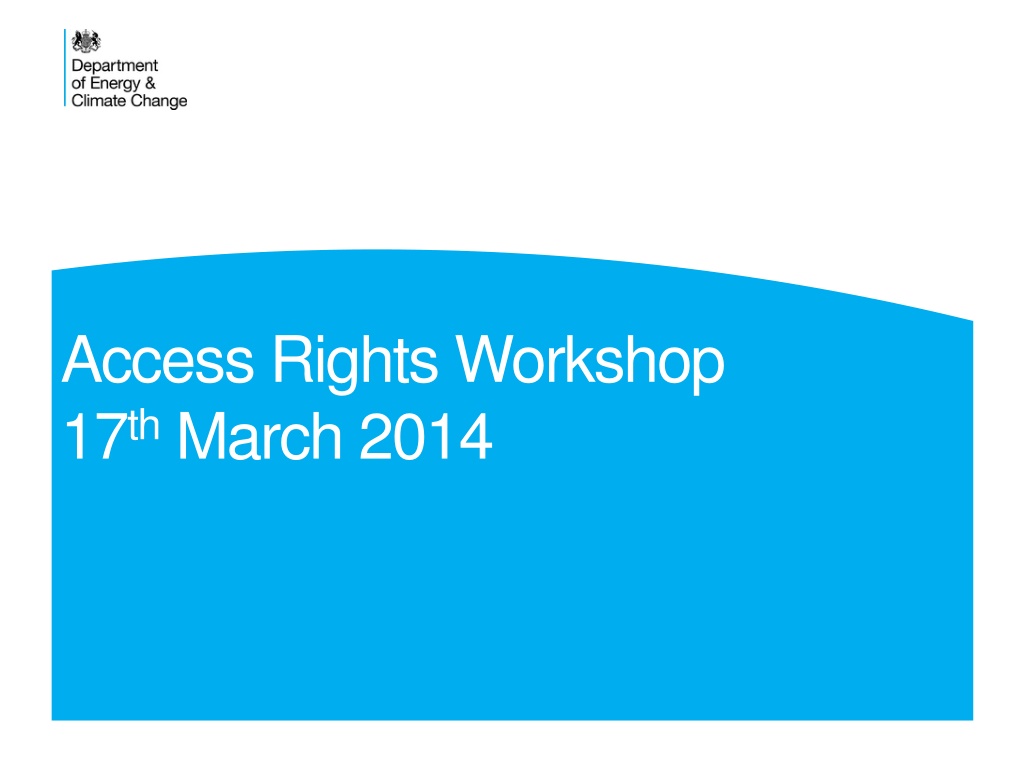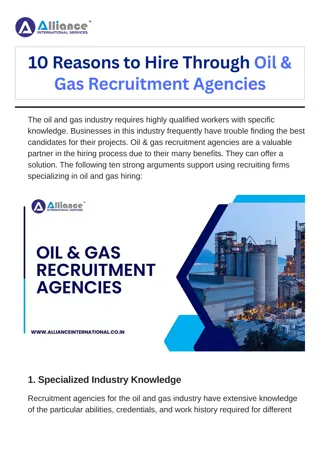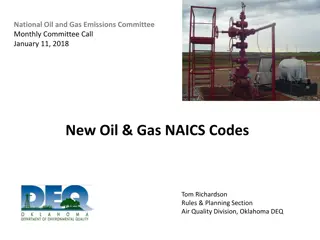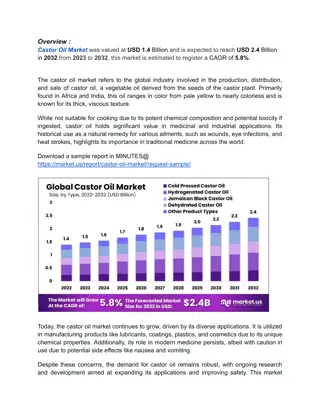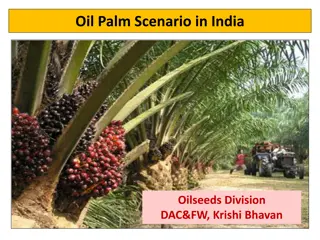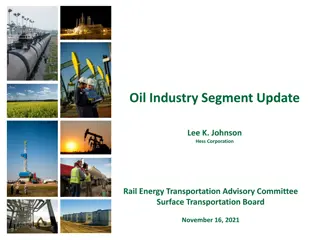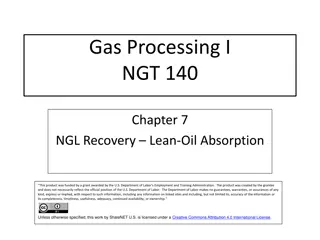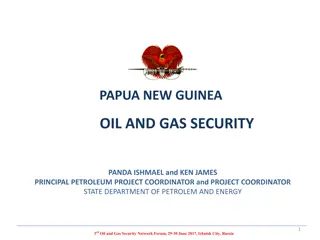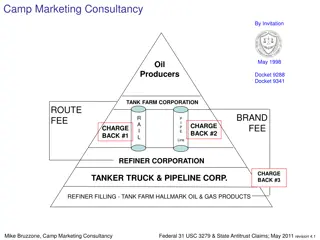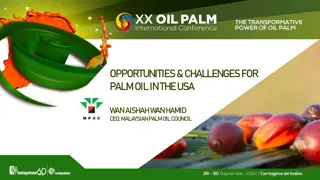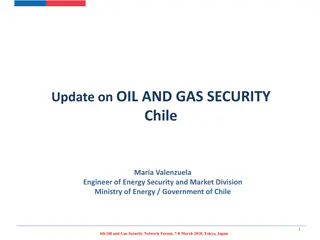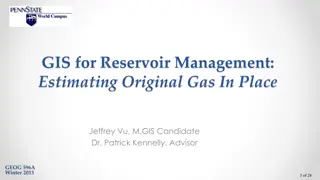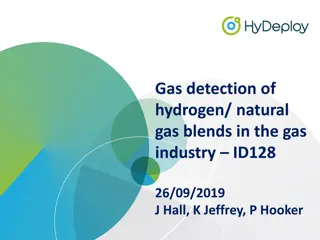Access Rights Workshop and Procedures in Oil & Gas Industry
Detailed information on access rights workshop and existing procedures in the oil and gas industry. Covering topics such as conventional vs. unconventional drilling techniques, geothermal schemes, legal positions regarding mineral rights, and the current process for underground access. Also discusses possible concerns with the current process, emphasizing the importance of negotiations with landowners for successful access.
Download Presentation

Please find below an Image/Link to download the presentation.
The content on the website is provided AS IS for your information and personal use only. It may not be sold, licensed, or shared on other websites without obtaining consent from the author. Download presentation by click this link. If you encounter any issues during the download, it is possible that the publisher has removed the file from their server.
E N D
Presentation Transcript
Access Rights Workshop 17thMarch 2014
Access Rights The Existing Framework James Clarke, OUGO Policy Development Workshop
Conventional vs. Unconventional Oil and Gas Unconventional Conventional Energy-Daily.com Conventional drilling has to date mostly involved vertical drilling: few landowners affected. New drilling techniques involve horizontal well creation over a mile below the surface. Each vertical well may have many horizontals (up to 2 miles long): more landowners affected SME.org 3 Access Rights
Geothermal Deep geothermal schemes typically require two boreholes: one for abstraction and one for re-injection Drilling depths are usually greater than 1.5km (and can be up to 5 km for deep geothermal power schemes) The horizontal distance between the points of abstraction and re-injection is usually between 1-2 km (though less for deep geothermal power schemes) 4 Access Rights
Legal position The Crown owns the Mineral rights to oil and gas in the UK. However, landowners own land rights on the surface, and underground with no defined depth limit. Currently, operators must identify & negotiate with landowners for both surface and underground access, or risk charges of trespass. Focus in this workshop is on underground access. Surface access involves only a small surface area and fewer landowners. 5 Access Rights
Existing Procedure for Underground Access (Oil and Gas) Identify Landowners Unsuccessful Successful Arrange compensation if needed Operator refers to Secretary of State Individual Negotiations Taken through the courts Access Granted Successful Unsuccessful Access Denied 6 Access Rights
Possible concerns with current process - Unconventional Gas & Oil Individual negotiations with landowners are lengthy and costs are unpredictable. Investment could be delayed and some investment lost to other markets, depending on the length of court cases. Could skew industries and their associated economic benefits towards areas with fewer landowners. Administration involved is disproportionate, if impact of underground activities is considered negligible. 7 Access Rights
Possible concerns with current process - Geothermal No legal route available where any one landowner refuses access. Deep geothermal heat schemes need to be sited in or near dense urban areas that offer the necessary heat loads. Heat networks, supplied with renewable heat, are a key plank of the Government s heat strategy. Leaving issue unresolved would prevent projects currently in planning or proposed from going ahead Negotiating access rights with every single landowner in a dense urban environment (where these could number thousands) would be a huge administrative burden. 8 Access Rights
Questions 1. What impact do you believe subsurface activities deeper than 100 metres have upon the landowner? 2. Is the current situation with subsurface access rights acceptable or problematic in your view? Consider potential costs and issues arising from the existing procedure, and impacts on shale and geothermal development. 3. How do you think this situation could best be improved, if at all? 4. Is any such action urgent, and if so why? 9 Access Rights
Access Rights Options James Clarke, OUGO Policy Development Workshop
Options Refine Existing Procedure Do Nothing ? Legislate for Automatic Access Rights 11 Access Rights
Options Continued Legislate for Automatic Access Refine Existing Procedure Primary legislation to grant automatic rights of access under certain conditions. Fix or cap compensation payments for individual negotiations. Consider possibility of group negotiation/notification. Grant relevant operators automatic access (under a certain depth) to land Note: NO existing procedure to refine for Geothermal Operators can commence operations following notification, without need for negotiation, subject to necessary permissions. May require some payment mechanism in return for the right of access (as per existing process). 12 Access Rights
Potential Payment Options Voluntary vs. Statutory Voluntary: Industry commits to providing a voluntary payment, sets appropriate limits and mechanism. Statutory: Payment mechanism is defined in primary or secondary legislation Individual: Payments are given to each affected landowner or resident. Would require locating and notifying individuals and setting payment level. Community: Payment is channelled through some local authority or body as a lump sum to distribute. Could determine how payment is to be spent. Individual vs. Community Could base on similar underground cases e.g. deep tunnels, pipelines, cables. Could ask third party to determine payment. Needs to reflect both value of the access rights and be considered a reasonable sum. How to set payment level 13 Access Rights
Questions 1. Is do nothing a practical option? 2. Do you think there are other options we could consider? 3. How could we streamline the existing procedure whilst allowing geothermal to develop? 4. Would some form of payment be appropriate, in the case of legislation for automatic access? 5. If so, what features (such as those outlined above) do you think such a payment should have and why? 6. When would be an appropriate time to provide payment? 14 Access Rights
